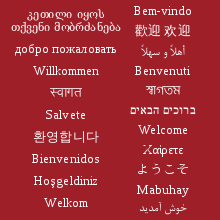Willkommenskultur
- View a machine-translated version of the German article.
- Machine translation, like DeepL or Google Translate, is a useful starting point for translations, but translators must revise errors as necessary and confirm that the translation is accurate, rather than simply copy-pasting machine-translated text into the English Wikipedia.
- Do not translate text that appears unreliable or low-quality. If possible, verify the text with references provided in the foreign-language article.
- You must provide copyright attribution in the edit summary accompanying your translation by providing an interlanguage link to the source of your translation. A model attribution edit summary is
Content in this edit is translated from the existing German Wikipedia article at [[:de:Willkommens- und Anerkennungskultur]]; see its history for attribution. - You may also add the template
{{Translated|de|Willkommens- und Anerkennungskultur}}to the talk page. - For more guidance, see Wikipedia:Translation.
Willkommenskultur (pronounced [vɪlˈkɔmənskʊlˌtuːɐ̯] ⓘ, in German: Welcoming culture) is a German concept which designates firstly a positive attitude of politicians, businesses, educational institutions, sports clubs, civilians and institutions towards foreigners, including and often especially towards migrants. Secondly, the term expresses the wish that all foreigners and migrant people encountered by these institutions may be accepted and particularly not be exposed to discrimination. Thirdly, the word welcoming culture means all the measures promoted by a positive attitude towards foreigners and migrants in others.[1][2][3][4][5]
The German word Willkommenskultur was voted Austria's "Word of the Year" in December 2015.[6]
Foreign perspectives
The Guardian distinguishes two meanings of the term welcoming culture:
Originally it was meant to attract people from abroad to Germany to compensate for a huge shortage of skilled workers, particularly in sparsely populated areas. Since the beginning of the European refugee crisis in 2015, the term was being used to promote assistance for millions of refugees coming to Germany,[7] who were received by highly visible posters "refugees welcome", and by actual help of any kind, mainly on private initiative of uncountable German citizens.

The French daily Libération adds that the word "welcome culture" was originally created decades ago in the tourism industry.[8] According to this view "welcome culture" would also be a Germanisation of the technical term Hospitality Management.
The New York Times suggested that Chancellor Angela Merkel was also laying the foundation for new "hyphenated German" groups, namely "the Syrian-Germans, Iraqi-Germans, Afghan-Germans", alluding to the phenomenon of hyphenated American identities. The concept has dramatically increased the sphere of influence of Germany.[9]

| ||
|---|---|---|
Revolution of 1989
Kohl government Leader of the Christian Democratic Union
First ministry and term
Second ministry and term
Third ministry and term
Fourth ministry and term
 | ||
|
References
- ^ "Muslims: The Willkommenskultur is a chance for reconciliation | ZEIT ONLINE". Zeit.de. 24 November 2015. Retrieved 27 January 2016.
- ^ "′Willkommenskultur′ in Germany, ′non merci′ in France | Germany | DW.COM | 17.09.2015". DW.COM. Retrieved 27 January 2016.
- ^ Hill, Jenny (3 November 2014). "Germany struggles to adapt to immigrant influx". BBC News. Retrieved 27 January 2016.
- ^ "Glossarartikel: Willkommenskultur | IQ Netzwerk Niedersachsen". Migrationsportal.de (in German). Archived from the original on 4 March 2016. Retrieved 29 March 2016.
- ^ "Gewinnung und Bindung von Neubürgern in der Region Schwarzwald-Baar-Heuberg". Wirtschaftsfoerderung-sbh.de. Retrieved 29 March 2016.
- ^ "'Willkommenskultur' is Austrian word of the year - The Local". Thelocal.at. 3 December 2015. Retrieved 18 June 2021.
- ^ Doris Akrap. "Germany's response to the refugee crisis is admirable. But I fear it cannot last | Doris Akrap | Opinion". The Guardian. Retrieved 27 January 2016.
- ^ "Willkommenskultur - Libération". Liberation.fr. 30 December 2015. Retrieved 27 January 2016.
- ^ "As Germany Takes in Refugees It Also Rehabilitates Its Image". The New York Times. Retrieved 27 January 2016.
This article about German culture is a stub. You can help Wikipedia by expanding it. |
- v
- t
- e












